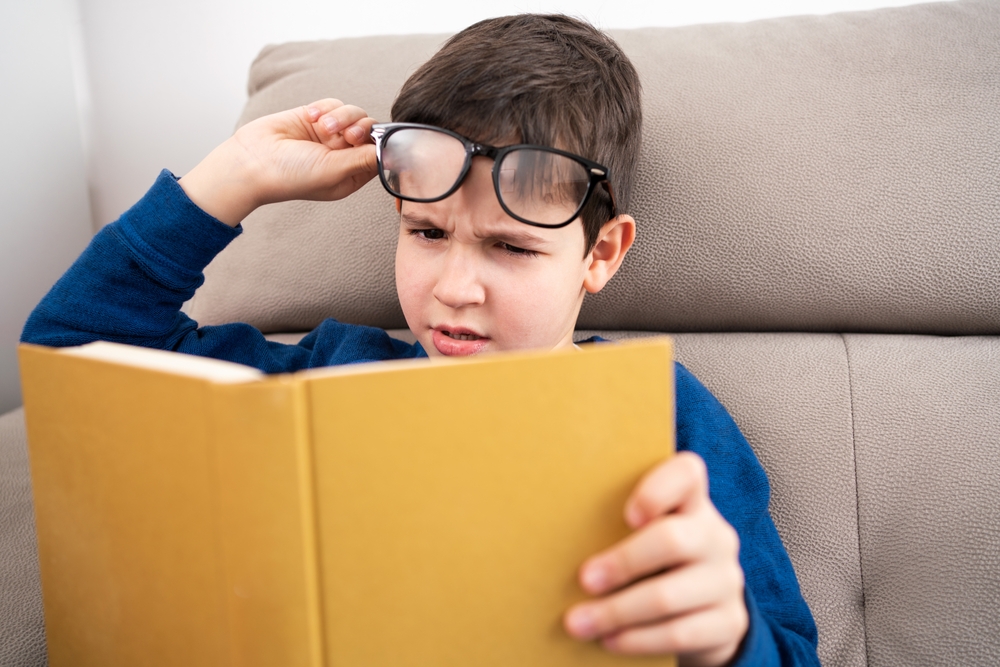
As a parent, it's essential to be aware of the signs and symptoms of myopia in your child, as early detection and intervention can make a significant difference in managing this condition.
Myopia typically begins to develop in childhood, often during the school years. The condition can progress rapidly during the growing years, leading to increasingly blurred distance vision. If left unchecked, myopia can continue to worsen, increasing the risk of serious eye health issues later in life, such as retinal detachment, glaucoma, and even vision loss.
Signs of Myopia Parents Should be Aware of
Recognizing the signs and symptoms of myopia in your child is crucial for early detection and intervention. Some of the common indicators include:
Squinting or Struggling to See Distant Objects: Your child may squint or tilt their head to see distant objects more clearly, such as the whiteboard at school or street signs.
Frequent Headaches or Eye Strain: Myopia can cause eye strain and headaches, especially after prolonged close-up work, such as reading or using digital devices.
Sitting Too Close to the TV or Computer Screen: Children with myopia may sit unusually close to the television or computer screen to see the content more clearly.
Difficulty Seeing During Outdoor Activities: Your child may have trouble participating in sports or outdoor activities that require clear distance vision, such as playing catch or reading signage.
Frequent Eye Rubbing or Blinking: Children with myopia may frequently rub their eyes or blink excessively, indicating eye discomfort or strain.
Why Regular Pediatric Eye Exams are Essential
Regular comprehensive eye exams with an optometrist are crucial for the early detection and diagnosis of myopia in children. These exams can identify vision problems and provide the necessary treatment and management strategies before the condition worsens.
During a pediatric eye exam, the optometrist will assess your child's visual acuity, eye alignment, and overall eye health. They may use specialized tools and techniques to measure the refractive error and determine the degree of myopia. By catching myopia early, the eye doctor can work with you to implement appropriate interventions and prevent the condition from progressing rapidly.
The Importance of Early Intervention in Managing Myopia
Early intervention is not only essential for managing myopia in children but also for supporting their academic performance. Uncorrected or worsening myopia can significantly affect a child's ability to see clearly in the classroom, making it difficult to read the board, engage in lessons, or focus on assignments.
Delaying treatment can also lead to more severe myopia, which increases the risk of long-term eye health complications. By addressing myopia in its early stages, you can help slow down or even halt the progression of the condition, reducing the potential for vision-threatening issues later in life.
Treatment Options for Managing Myopia in Children
There are several treatment options available for managing myopia in children, and the most appropriate approach will depend on the severity of the condition and your child's individual needs. Some of the common treatment options include:
Prescription Eyeglasses or Contact Lenses: Corrective lenses, such as eyeglasses or contact lenses, are the most common and effective way to improve your child's distance vision. However, they do not slow the progression of myopia.
Orthokeratology (Ortho-K): This involves the use of specialized, rigid gas-permeable contact lenses worn overnight to temporarily reshape the cornea and improve daytime vision without the need for glasses or daytime contacts.
Atropine Eye Drops: Low-dose atropine eye drops have been shown to slow the progression of myopia in some children, although the long-term effects are still being studied.
Multifocal or Bifocal Lenses: These specialized lenses can help reduce the rate of myopia progression in children by providing different focal points for near and distant vision.
Schedule Your Child’s Eye Exam with Brianna Herring O.D. Today
Myopia is a common vision condition that can significantly impact a child's quality of life and long-term eye health. By being aware of the signs and symptoms of myopia, and ensuring your child undergoes regular pediatric eye exams, you can help detect the condition early and implement the necessary interventions to manage it effectively.
If your child is showing signs of myopia, schedule their pediatric eye exam with Brianna Herring O.D. Visit our office in Deerfield Beach or Plantation, Florida. Please call (786) 891-2020 or (954) 472-2676 to book an appointment today.




